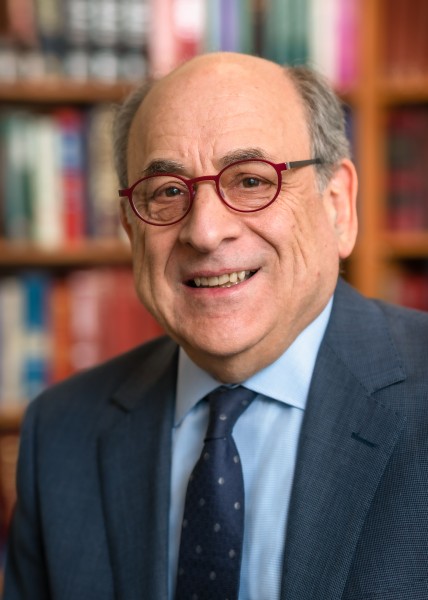2022 Canada Gairdner Award given to Stuart H. Orkin, MD, researcher at Dana-Farber/Boston Children’s Cancer and Blood Disorders Center
Newswise – TORONTO, ON – The Gairdner Foundation has announced that Stuart H. Orkin, MD, is one of the 2022 Canada Gairdner Award laureates for groundbreaking discoveries and contributions to biomedical science.
Orkin, the David G. Nathan Distinguished Professor of Pediatrics at the Dana-Farber/Boston Children’s Cancer and Blood Disorders Center and Harvard Medical School, and a Howard Hughes Medical Institute Investigator, was recognized for the discovery of the molecular mechanism responsible for the switch from fetal to adult hemoglobin gene expression during human development and translating that knowledge into a new treatment for the hemoglobin disorders – sickle cell disease and beta-thalassemia.
The Gairdner Foundation was established in 1957 by Toronto stockbroker James Gairdner to give annual awards to scientists whose discoveries have had a profound impact on scientific progress and human health. Since 1959, when the first prizes were awarded, 402 scientists have received a Canada Gairdner Award and 96 have received the Nobel Prize to date. The Canada Gairdner Awards promote a stronger culture of research and innovation across the country through outreach programs, including lectures and research symposia.
Orkin’s pioneering work in genetic disorders of hemoglobin spans four decades and has unraveled molecular mysteries behind how blood cells develop and how disorders of blood arise. His most recent studies led to the discovery of the molecular mechanism responsible for the switch from fetal (HbF) to adult (HbA) hemoglobin gene expression that occurs during human development. Building on genetic clues from human population studies, Orkin and colleagues determined that the protein BCL11A acts as the critical damper of HbF expression in adults. Recognizing that re-enabling HbF expression could reduce disease severity in sickle cell disease and beta-thalassemia – genetic disorders that affect HbA production – he proposed down-regulation of BCL11A as a therapeutic approach. Decreasing the amount of BCL11A would reactivate HbF expression and effectively replace the mutant or deficient HbA in these conditions. His group first showed that downregulation of BCL11A expression corrects sickle cell disease in engineered mice, an important proof-of-principle for therapeutic translation. He and colleagues identified a distinct site in a regulatory element within the BCL11A gene itself that, if deleted by CRISPR gene editing in blood stem cells, would affect BCL11A expression only in developing red blood cells and safely reactivate HbF expression. This work laid the foundation for promising, ongoing clinical trials in patients with sickle cell disease and beta-thalassemia, diseases that affect more than 5 million people worldwide. Reactivation of HbF in patients in these genetic therapy studies has yielded transformative results: freedom from sickle crises and anemia in sickle cell disease and transfusion independence in beta-thalassemia.
His work has had a huge impact and much of what is known about the control of gene expression during blood cell development can be traced directly to Orkin’s groundbreaking studies. His discoveries have paved the way for clinical approaches that will revolutionize the treatment of hemoglobin disorders — sickle cell disease and beta-thalassemia — that affect more than five million people worldwide. Clinical trials currently underway are establishing the therapeutic potential of HbF reactivation. The results of these studies will have a significant impact on patients suffering from hemoglobin disorders worldwide, and will encourage the future development of cheaper and more easily accessible therapies for worldwide application.
More information about the other prize winners is available at: www.gairdner.org
About Dana-Farber/Boston Center for Childhood Cancer and Blood Disorders
Dana-Farber/Boston Children’s Cancer and Blood Disorders Center – one of the top pediatric cancer centers in the country, according to US News & World Report – brings together two internationally renowned research and education institutions that have provided comprehensive care to pediatric oncology and hematology patients since 1947. The affiliated departments of Harvard Medical School share a clinical staff who provide clinical care at Boston Children’s Hospital and most outpatient care at the Dana-Farber Cancer Institute. Follow the center on Twitter at @DFBC_PedCare.
About the Gairdner Foundation
The Gairdner Foundation was established in 1957 by Toronto stockbroker James Gairdner to give annual awards to scientists whose discoveries have had a profound impact on scientific progress and human health. Since 1959, when the first prizes were awarded, 402 scientists have received a Canada Gairdner Award and 96 have received the Nobel Prize to date. The Canada Gairdner Awards promote a stronger culture of research and innovation across the country through our outreach programs, including lectures and research symposia. The programs bring current and past laureates to universities across Canada to speak with educators, interns and high school students to inspire the next generation of researchers. Annual research symposia and public lectures are organized across Canada to give Canadians access to leading science through Gairdner’s on-call staff.
†


Comments are closed.